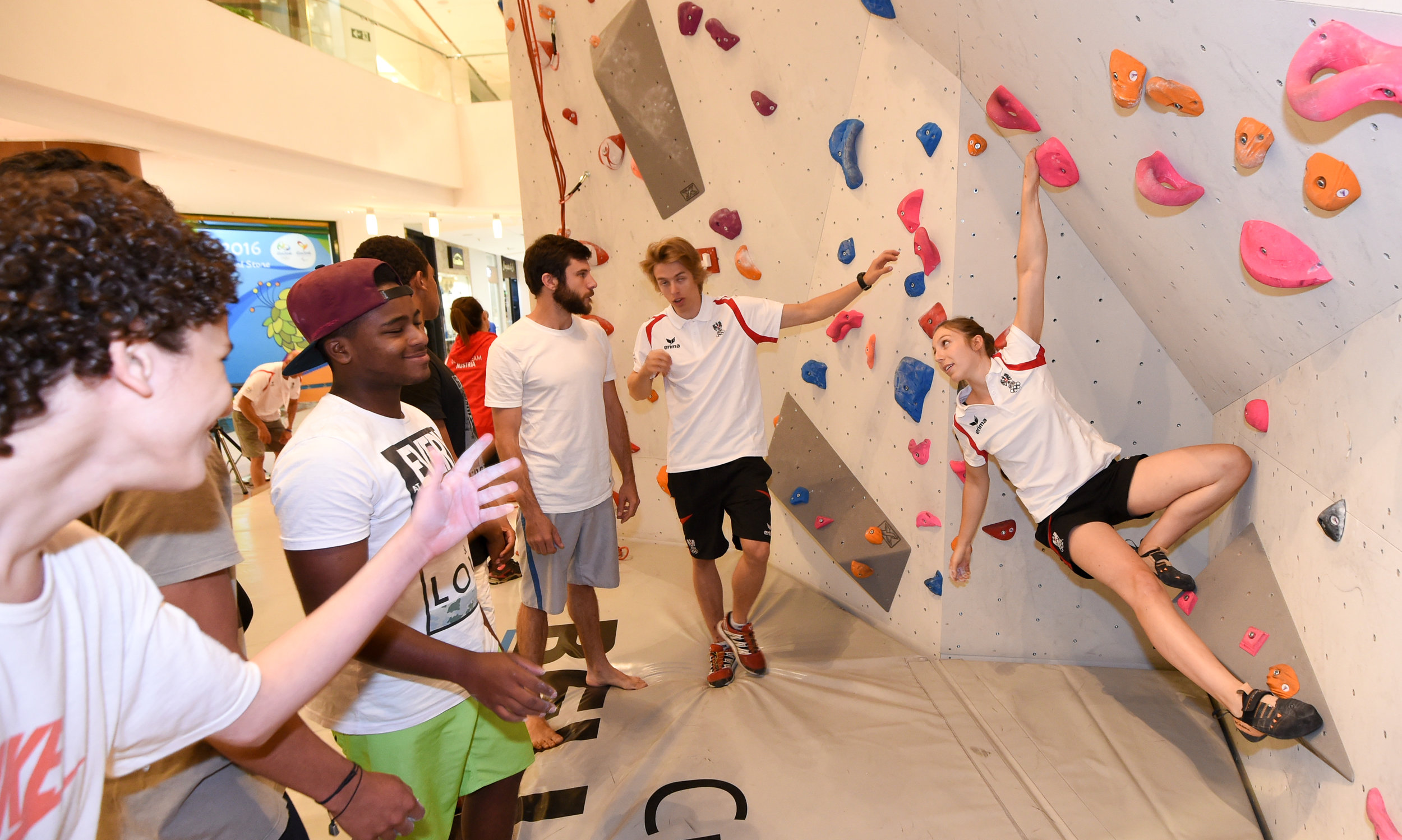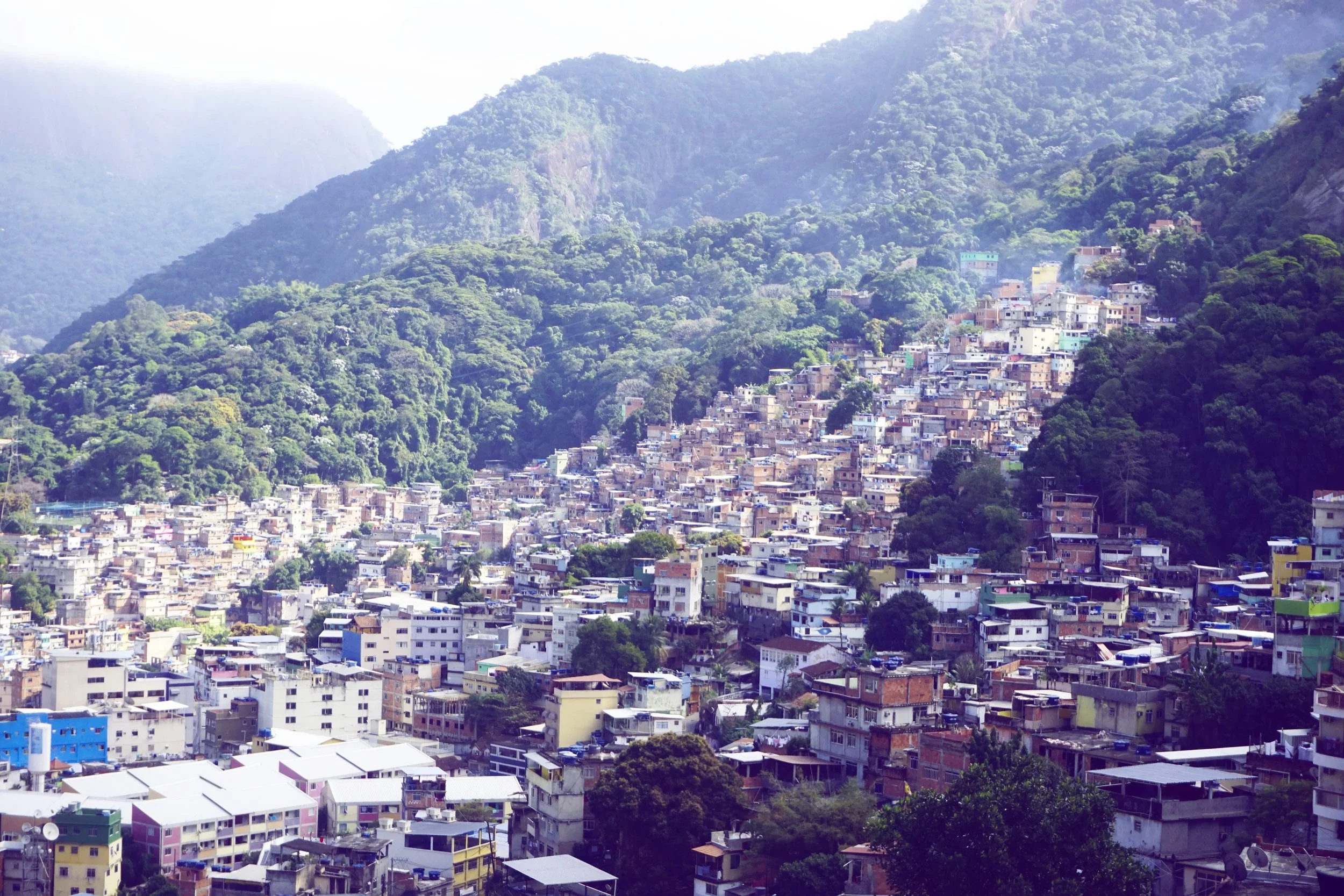CLIMBING IN RIO 2016
I just came back from Rio - and I'm still buzzing thinking of all the things that we got to experience during the past month. Rio was a funky, vibrant & colourful city, the people were really lovely and there always seemed to be music floating in the breeze of the wind.
Kathi Bacher, Andi Aufschnaiter, Lukas Schnöller and me - alternately supervised by Heiko Wilhelm, Hans-Peter Sigrist and Urs Stöcker - were there to promote climbing to Brazilians in Rio's biggest shopping center, Riosul. It was an initiative by the Austria Climbing Team and the Austrian Olympic Comitee. Climbing had just been announced to be Olympic for Tokyo 2020, so it was a great opportunity to present this new Olympic sport. Plus, the wall was built up in a shopping center directly next to the Austria House which was, in turn, meant to showcase the best of Austrian culture and cuisine. As Austria is known as a country of endless and awesome climbing opportunities, it seemed just perfect to connect these two things as a marketing gig - the Austria House and the climbing wall.
And indeed - climbing was booming. Every day there was a large crowd waiting for their chance to climb on this new built Art Rock wall. Even though everyone will have to admit that belaying up to 250 people a day can be tiring, it was amazing for us all to see people being so motivated for our sport!
One of our main projects was going climbing with kids from favelas around Rio as part of a community project. And as this was for sure the most exciting and coolest part of our whole climbing project here in Rio, I would like to tell you about this project in more detail! Firstly, Heiko went climbing with them in Rocinha, one of Rio's favelas, once. We ran two workshops with them afterwards. Their motivation was truly inspiring - you must imagine young adults aged around 15 - 18 years who most possibly grew up in conditions that most of us could never imagine. Speaking of that, I found the word "kids from the favelas" quite stigmatizing. Even though they grew up in different environments, we shouldn't forget that they were adolescents like any other. They were constantly smiling, laughing, joking around - eager to learn something new and to go climbing. We had so much fun!
Here a funny story: The first time they visited us at the climbing wall in Riosul, they were invited for lunch in the VIP area of the Austria House by the officials of the Austrian Olympic Comitee (Florian Gosch, Peter Mendel and Karl Stoss). What's typical Austrian cuisine? Of course: Schnitzel for main course and Kaiserschmarren for dessert. I love Kaiserschmarren - and we speak of five domes cooks, the Kaiserschmarren was indeed super delicious! Watching the kids being served their dishes, I had to think of my own travel experiences when first coming to a foreign country, being exposed to a new, exotic cuisine maybe not even knowing of what was inside my dish or how it was prepared. I'm always really cautious and suspicious at the beginning, always carefully and slowly getting used to the food and trying out new things only as time runs by. That's exactly how they behaved when being served Schnitzel and Kaiserschmarren - cautious and suspicious (incomprehensible for those of us, who love Kaiserschmarren or Schnitzel, yet understandable from their perspective as this was something completely unknown and new for them). As for the Kaiserschmarren, they thought it was an uncooked cake which was taken out of the oven too early and then someone mixed it up with their fingers. Lots of giggles when they told me!
Another funny story: We had quite some troubles understanding eachother at the lunch table due to the lack of everyone speaking English, so there was a lot of pantomime, gesturing and a mixture of languages. When they first told me about the "uncooked Kaiserschmarren cake", they used a phrase that meant something like "a bowl of dough" in Portuguese. I tried to repeat it in their language but I totally sucked at it. I mispronounced one word and all of a sudden the whole group started bursting into laughters - I had said "a bowl of bums" in Portuguese. Obviously I had no clue what I had just said.
A glimpse of colourful, smoky & peaceful looking Rocinha
So what is the community project exactly about and who initiated it?
After the Olympic games, the climbing wall & gear was left to the project which is currently located in Rio's biggest favela Rocinha. Its aim is to foster climbing among the children there. Rocinha has more than 70.000 inhabitants and stretches over the backside of the mountain Dois Irmãos ("Two Brothers") splitting the wealthy beach neighbourhoods of Leblon and São Conrado. Many of the people there live below the poverty line in ruinous homes. Kathi, Lukas and I had coincidentally taken a guided tour through it on one of our first days in Rio - we had not known yet that this would be the exact same favela as where Andrew Lenz would have established his climbing project.
Andrew Lenz is the initiator of this project which was started in 2010. He had already been part of other social programs, such as a major one in Mexico, and as a climber he knew that climbing had a really positive effect on himself and his wellbeing, he decided to share his passion with others that normally wouldn't have that chance.
"I think climbing helps with a lot of different things: self esteem, confidence, responsibility, discipline, fitness, personal motivation, contact with nature, adventure, etc. I think passing those benefits on to kids living in the favelas can be very helpful to them. Climbing can be a tool to help them deal with the problems they face every day." [Andrew Lenz]
They had built a small wooden wall in Rocinha which would be opened three times a week, plus - of course - the marvelous rocks surrounding Rio. As said, the climbing equipment (shoes, harnesses, belaying devices), wall and holds (sponsored by Salewa, Art Rock and Scarpa) was going there after the Olympics. The wall itself is currently stored in a warehouse which could be a possible place to build up the wall again in the near future. The warehouse is located in the port district, close to many different favelas. The plan is to expand the program to these other favelas around the city, too. Moreover, it would also be in a good enough place that the wall could also be opened up to the general public. Ideally, the goal is that the wall generates enough money to cover most of the costs for running the social program. However, until this will be decided, probably some more time will pass by. The warehouse is currently controlled by the city government and elections are coming up next month, so everything might change.
Video of the climbing wall built in Rocinha
Andrew believes that this project can be huge and that the Austrian climbing wall is a good first step for that. The aim is to support these kids who start climbing to develop as individuals, learn to deal with (every day) challenges and use their acquired skills for future dares, challenges and provocations independently on whether they continue to climb or not.
“Climbing is fun and extreme. Some of my friends have gotten into drugs. I didn’t because I had the opportunity to climb.” [Alexandre Santos, 17 years, Rocinha, biggest idol: Alex Honnold]
I totally love the idea of this project. Fostering e.g. self esteem, confidence, responsibility or motivation among young adults is hugely important for our personal development to become mature and sensible persons. (They also are very frequent topics when working in the field of sport psychology). Generally speaking, we were all really happy that we could support this project (even if we believed we could have done more). Feel free to contact Andrew himself if you want to find out more or want to support it!
Here is one last video of the community project in Rio, initiated by Andrew Lenz.
To sum it all up, Rio was great. Besides being at the climbing wall, we also experienced lots of other great things: we got to see Rio's most important sights (Jesus statue, Sugarloaf Mountain, etc.), swam in the sea, had coconuts to drink, went bouldering to the jungle/ sea side once, went to a typical Brazilian street party and danced horribly compared to all the Brazilians next to us, had lots of Caipirinha, had lots of exotic fruit juices, watched the one or other Olympic game/ match, didn't get killed in a taxi and simply had a blast!
Thanks to everyone who made Rio so memorable! Hope to see you again next time!

















